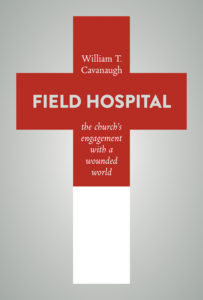 The Church’s Engagement with a Wounded World
The Church’s Engagement with a Wounded World
In 2013, Pope Francis famously said, “I see clearly that the thing the church needs most today is the ability to heal wounds and to warm the hearts of the faithful; it needs nearness, proximity. I see the church as a field hospital after battle.”
William Cavanaugh’s publication, Field Hospital, expands on this metaphor to explore the ways in which the church can meet the spiritual and material needs of the world. Most importantly, the church must acknowledge its responsibility in the existence of human sin as opposed to assuming a position of superiority. Considering the intersection of theology with themes of religious freedom, economic injustice, religious violence, and other pressing topics, Cavanaugh pens a field manual for faith communities to expand their mission of healing beyond church walls.
Reviews of the book include:
“Political theology at its best. Field Hospital confirms Cavanaugh as one of the most lucid, innovative, and interesting theological voices of our time. He has that rare ability to take complicated philosophical arguments and ideas and present them in simple and clear ways for both an academic and a general audience.”—PLT Contributor Emmanuel Katongole, Kroc Institute for International Peace Studies, University of Notre Dame
“Richly instructive. . . . Bill Cavanaugh intrepidly goes where few theologians dare to go, and his questions and answers remain resolutely theological against the strongest temptations to bow to the accepted discourses of our age. Those seeking to understand the perspectives that inspire Caritas in Veritate and Evangelii Gaudium need search no further: this is the book to read.”—Matthew Levering, Mundelein Seminary
“Field Hospital sets forth an utterly unsentimental vision of the church as imperfect and vulnerable, her ‘power made perfect in weakness.’ Cavanaugh shows again why he is one of contemporary Catholicism’s most important thinkers.”—Joseph L. Mangina, Wycliffe College, University of Toronto
Find additional information on the publication here.
Fellow travelers are scholars, activists, and practitioners that embody the ideals and commitments of the Project on Lived Theology. We admire their work and are grateful to be walking alongside them in the development and dissemination of Lived Theology.
